#it all just adds SUCH a layer of tragedy to his character!!!!!!!!!!!
Explore tagged Tumblr posts
Text
OP I sincerely hope you don’t mind me writing an essay in the tags cuz I have Luis Serra autism this is like. My jam ABDBWHBEHDNDHX
So here's the thing. I do think Luis worked on Project Nemesis in the remake timeline. I tried double checking the in game evidence around this statement, and it's still a little vague but why not. At the time he is in his early 20s which, for a lot of people, is a very high pressure time of growth. Navigating adulthood, figuring your personhood out, and feeling like there's an invisible timer to accomplishing something important are pretty common experiences for that age range. Not to mention just trying to survive at all when living and supporting yourself is being balanced with the rest of that nonsense.
Before the project, I do think Luis was working on standard over the counter medicine. I think his genuine goal was to make something that hadn't been done yet. He wanted to make something there was a need for and he failed. He kept failing utterly at it, and his self-esteem took some heavy hits during this process. This meant when he was offered to start working with his team named on his lighter, he goes for it. He's also good at it. Great at it. For some reason, working with parasites comes completely natural to him. He makes a lot of breakthroughs, and the praise he receives in return diminishes the self-deprecation he might've been lumping on himself for past failures. He's pretty sure he's found his calling until he gets to see what they've made together.
And it's horrible. It's the opposite reaction of what Wesker has with the completed Tyrant. He's terrified. He's confused. He's maybe even angry with everything but especially angry with himself, and he knows what happens after this. He knows with a success there'll be more. He knows with a success they won't stop, so he runs away. He puts a lot of effort into vanishing since he knows he's the key to keeping a smooth manufacturing process, and he's right. They can only make the one, and the issues he theoretically could solve for duplicates he is no longer there to solve.
He probably mopes for a while, tries to tell himself there was nothing more he could've done, and he goes home to see the people he knew falling ill. With parasites. That's his thing! That's his thing he can do!!! That's his thing he can fix!!! The leaders, only one of which he did trust, gave him the gracious opportunity to fix it. To save people. To save the people he knew, and he succeeds. He makes something to save those people only to find out it was a lie. All of it.
It's not like the first time where he chose to make something horrible for the sake of needing a win only to run away from the consequences. This time he went in with good intentions to help people and stop a plague only to become a tool in progressing it. No wonder he was so desperate to help when we see him interacting with Ada in the DLC. He's trying so hard to do everything on his own terms to get the results he wants because the failure of upholding his code of ethics led to the production of a weapon of terror and the success of upholding his code of ethics led to the production of a weapon of terror, so when does it end!!!!! When do his intentions actually have the effect he desires? When can his mind, his skills, his abilities actually help people for once? And then Leon and Ashley appear, and his work helps them like he wants it to help people, and he never gets to bask in that accomplishment!!!!
#G O D to think about how horrified he must’ve been when he found out something he put his whole heart and soul into with the intention of#doing good turned out to be a Bioweapon must’ve been AWFUL#like I don’t think Luis CHOSE to make something horrible or ever WANTED RO- like he was making over the counter medications too he honestly#wanted to help people!!!!!! that’s the whole core of his character!!!!!!!!#and yeah there probably W A S some air of wanting to be accomplished cuz like- how could there not be??? he came from NOTHING and he has no#family ofc hes gonna be thrilled by the opportunity to make something of himseld!!!!!!#and his umbrella coworkers liked him!!!!! he was liked by the people around him!!!!! ofc he’s gonna take pride in his work cuz he’s#truly under the impression that he’s doing good!!!!!!!!! he’s always been a compassionate person!!! at least tonme!!!!!!#and maybe he DID have an inkling that Nemesis was going to be a tool for war- maybe he held onto that blind quixotic hope that he could#change it and turn it around and Just Maybe his gut feeling is wrong#or maybe he legitimately had absolutely zero clue#either way it’s fuuuuuuuuuuuuckin DEVASTATING to view his character from this angle!!!!!!#he probably held SOOOOOOOOO much resentment towards himself he would’ve felt awful cuz like yeah who wouldn’t!!!!!!!#everyone around him dies; his grandfather#his coworkers#Bitores Mendez to some extent#then we get to Los Illuminados and like….. of course he’s gonna wanna help them!!!!!! those are his FAMILY!!!!!!!!!#*Valdelobos Not los Illuminados sorry im not re typing that HANSHWNEHENSJ#but by the time he finds out Los Illuminados’ true intentions; it’s way too late. he’d literally be TORTURED if he tried to run away or stop#helping them#(and I think it was probably kinda the same dhilemma with umbrella; he would’ve either been out in prison after the rc trials or have god#knows what done to him by umbrella)#it all just adds SUCH a layer of tragedy to his character!!!!!!!!!!!#and also I just. hate the misinterpretations of him with a. violent passion#people who say he 100000% totally knew what nemesis was and was gonna be and he was just working on it cuz he was an evil dude#or people who say he was totally complaicent in Los Illuminados’ actions#and that he was totally evil the whole time until he met Leon and suddenly a flip switched like#no absolutely not. it’s SO important to remember he grew up in an isolated catholic cult with no prior knowledge to the outside world and#was most likely preyed on by Umbrella for that exact reason. he would have never wanted to help LI that was his OWN VILLAGE#those were the OPPRESSORS and when you view him from a real-world historical Spanish standpoint it all makes a lot more sense. he isn’t evil
43 notes
·
View notes
Text
Bill & Ford & A Book, Oh My!
DISCLAIMER: The Book of Bill has Bill Cipher serving as an unreliable narrator. If we go out trying to say something is "definitively a truth" or "definitively a lie", we're going to keep arguing about it until the heat death of the universe. This is just my own personal interpretation of the source material. If you don't agree, that's fine! Also TBOB spoilers abound.
So it's no secret that interest in the dynamic Bill & Ford have (enemies, platonic, romantic, formerly romantic, whichever way) has really skyrocketed since TBOB's release. Of course, there are the 'easy' culprits to point towards, with Mabel referring to Bill as 'being like a needy ex', and the whole O'Sadley's fiasco (Him literally crying over losing Ford and going "one Sixer, please"? Messy. Messy behavior. Still, I think it goes so much deeper than that.
Bill, being the unpredictable chaos entity that he is, also serves as the main antagonist for a show about family and having close bonds with each other. We don't really need to look into his inner psyche that much, because that's just not what he needed to be doing at that point in the cartoon. He's meant to be a way to divide the Pines, really. And a silly little guy. A silly little obstacle. So, naturally, when it came to Bill's arguably "closest" relationship to someone in the show (Ford), it was very easy to interpret it as Ford being tricked by a completely apathetic Bill, who was just using him as a rung on the ladder. And I do want to stress that Ford and Bill's physical actions remain fairly consistent throughout interpretations, and focusing on the fact that Bill badly hurt Ford is important, so if that's how you still see it, then fine by me! No harm no foul!
But I think the relationship, their story, their tragedy just becomes so much more interesting with the lens The Book of Bill has presented. We’re finally able to see Bill’s perspective as a “protagonist” of sorts in a medium where he’s not just something to defeat- and that’s something we’ve never gotten before, so it’s shedding light on an area we didn’t know about for sure! Again, Bill is lying to the character of "the reader", so we can't trust it as a completely unbiased source. But we can speculate on where the "truth" is between these lies.
First of all, Bill's backstory was that he destroyed his home dimension- we knew that already. But now, with the extra content we have about it, we see something interesting- that Bill's backstory mirrors Ford's to an uncanny degree.

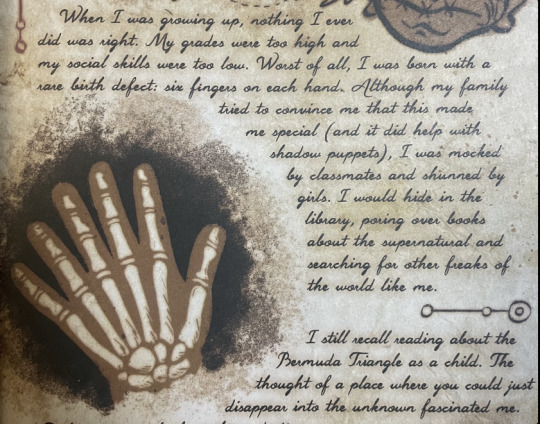
Both of them champion their intelligence, although they highlight how it set them apart from others, as well as highlighting their own 'rare mutation/birth defect'.

Again, with this self-isolation already spurred on from their "weirdness", but also as a little aside, I would also like to highlight that Bill being 'ready to be one', looking up at the stars, striving to 'reach' them, is a shared motif he has with Ford, who is also associated with space, the stars, and reaching them.
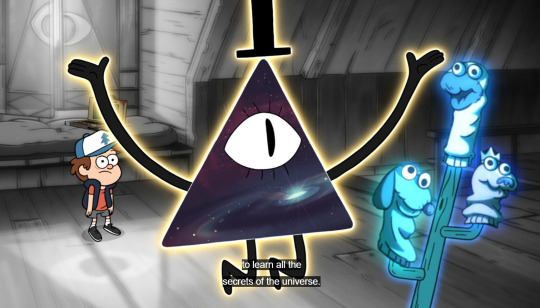
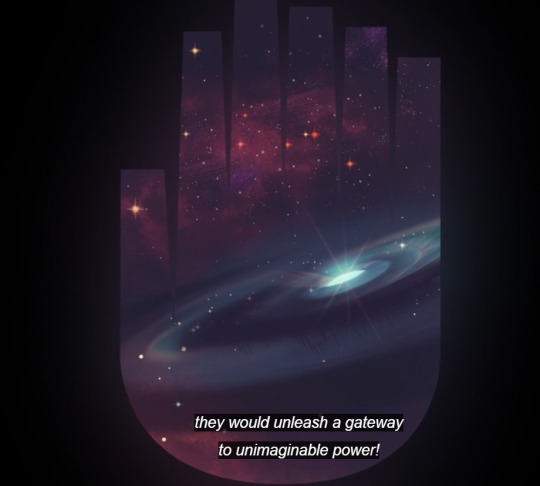
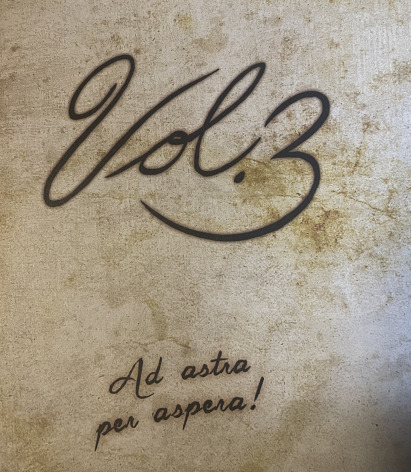
Bill's 'trying-really-quick-to-convince-Ford' fantasy sequence even has him in a field of stars as a sort of "ultimate wish fulfilment". Remember, this is Bill showing Ford something he thinks would win Ford over, at least a little.
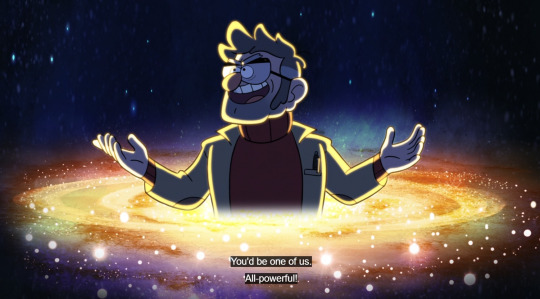
(And I'll take a quick time out for this train of thought to point out- hey! Bill admits he sought out most of his other victims, but Ford summoned him, and it took him by surprise! That adds a fun little layer of complexity to everything, don't you think? Another little layer of humanity for this whole mess- Bill didn't expertly seek out the 'perfect victim' or anything, it was just... luck. Some twist of fate.)
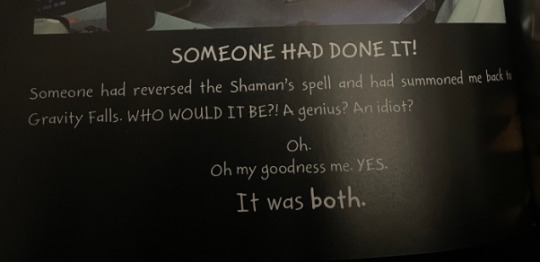
Anyways.
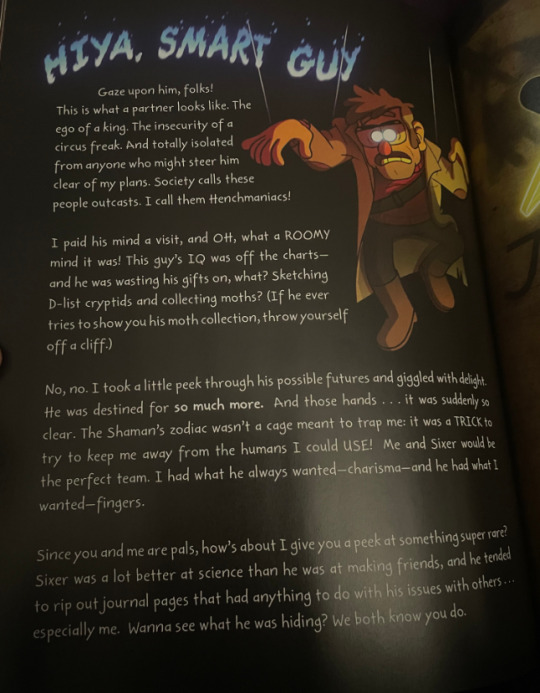
Obviously, the intro page to the 'Sixer' section has a ton of red flags galore (I mean, poor guy's literally depicted as a hapless puppet. C'mon, Bill. Not to mention the "OH BOY HE'S ALREADY SO ISOLATED, IT'S PERFECT" thing.). This guy is kind of a terrible companion no matter how you slice it. He's terrible to everyone close to him, because he's a deeply traumatized character who refuses to heal. BUT, the wording here is kinda deliciously intriguing to me. All of humanity is Bill's puppets, his future victims, but to me, it's clear that he holds a fondness for Ford. From "This is what a partner looks like", to "Me and Sixer could be the perfect team", to "He had what I always wanted- fingers" (drawn to his strangeness, maybe?), "He was destined for so much more", "I looked at his futures and giggled", and most stand-out to me, "Society calls these people freaks, I call them Henchmaniacs!"
Going back to the pre-Book of Bill era I was talking about, Bill's offers for Ford to join him were always in a sort of murky territory for interpretation. The first offer could definitely be read as mocking, with the line "WITH THAT SIX-FINGERED HAND, YOU'D FIT RIGHT IN WITH MY FREAKS!" in particular making it seem like Bill was only saying that to rub Ford's strangeness in his face, and the second offer to join Bill being under a new circumstance- that now Bill is desperate and believes Ford is the only one who can help him. But the Book of Bill mentions the idea of Ford becoming a Henchmaniac more than once, and also has Bill upset at losing Ford and claiming "he'll be back", as well as Bill seeming to use "freak" more like a badge of honour, and having previously complimented Ford's six fingers (In the Sixer intro page, he highlights Ford's fingers as a quality he likes, and in the pages about bodies, he states that "humans should have more fingers". To me, that first offer reads more now like Bill being genuine about finding Ford a place among his misfits. ...Although, the moment Ford says no, he does zap him into a statue. So. Y'know. He's still got issues.
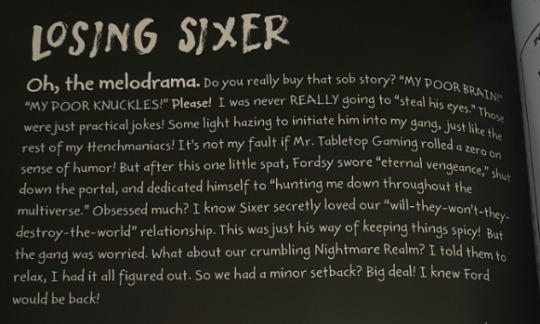
(Yeah, again, red flag city. "Just hazing"? Bill, none of what you were doing over there was okay! You might have suppressed everything traumatic that happened to you, but that doesn't mean you can go around traumatizing everyone! Good lord.)

Bill has already been imply to like other characters because they remind him of himself. Pointing towards a connection with a character Bill DOESN'T have a weird undefinable ex-partner thing with... Mabel! Alex has says in multiple official media and interviews that Bill sees a lot of himself in Mabel, and essentially, that he thought Mabeland was the perfect prison because if HE liked all that awesome, uncontrolled chaos over any family or friends, why wouldn't SHE? And we see that again in TBOB. So basically, what I'm saying is that we have two characters to back up the fact that Bill seems gravitated towards humans or other living beings that he views as being 'like him'- beings he can relate to! So, y'know, what does that say about Bill and Ford?

There's also Bill's plans for the reader and "Weirdmageddon 2.0", where he portrays the reader as getting to, like, perch on his arm like a little bird and get their own little crown? And specifically calls out Ford for not going through with things?? Okay, Bill??
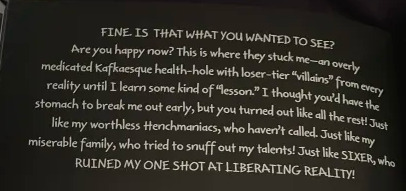
AND Ford not only being the only human mentioned on the list of people he "definitely doesn't miss so stop asking", but also having his own category? Alright, man.
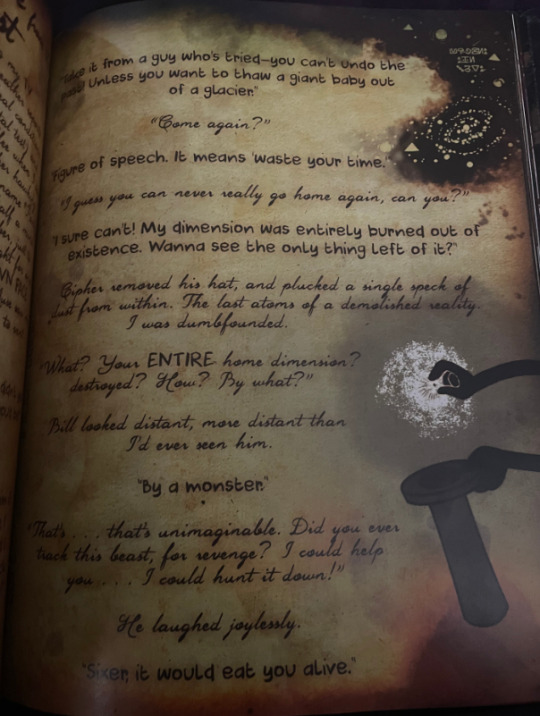
Of course, another point to the 'Hey, maybe Bill can actually feel emotions towards humans besides complete and total apathy' club is this page here, which has ALSO been hotly debated! Certainly, we know he's telling the truth about his home dimension being destroyed, and we know that he's lying about the 'monster', but some interpret this scene as Bill not being remorseful at all and playing his reaction up to earn Ford's sympathy. And me, personally, I dunno if I agree. I feel like the specific inclusion of Bill "looking distant, more distant than I'd ever seen him" (Mirroring the fact that he keeps blacking out when thinking about all his large-scale massacres) and him "laughing joylessly", I think this sequence is meant to tell us that Bill actually is being vulnerable with Ford here, it's just hidden under layers and layers of deceit, whether towards himself or Ford or both.
And finally for my Book of Bill collection stuff, there's the stuff that could be read as more romantic in nature. In the 'love' section, Bill claims he doesn't love anyone, but, like-

Come on. You can disagree with me that it's Ford, but he does have exes. And he's clearly not over them. Shrimpy little liar. And then there's the fact that a lot of his hokey 'advice' is stuff he ends up directly doing to Ford.

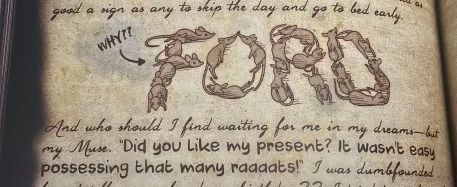
These rats.
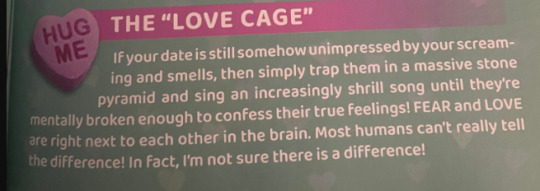
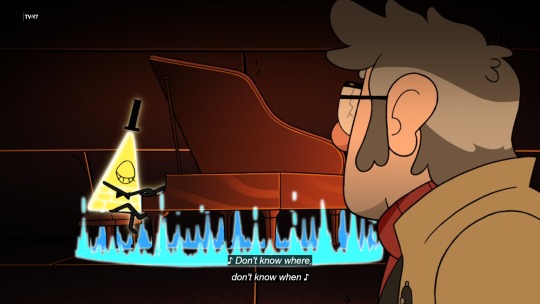
The Love Cage.
The Book of Bill really outlined all that in bold, but in my opinion, it was never an entirely new revelation! Bill seems to hold a preference for Ford over other humans in the show. He shows up in Ford's dreams just to say hi, tease him, and gloat (Mabelcorn) unlike the other two dream appearances he's made (Dreamscaperers, Sock Opera) which were exclusively for business purposes. Unlike every other character that gets exclusively one nickname for their zodiac sign, Ford gets multiple (Fordsy, IQ, Sixer, smart guy, brainiac, the list goes on). Bill asks Ford to join him TWICE, whereas anyone else who tries gets their face rearranged, put in a cage and made to dance, frozen in stone, etc etc. And finally, I think, the most emblematic of Bill's weird, specific relationship with Ford, is that whereas everybody else gets turned into stone, Ford got turned into gold.
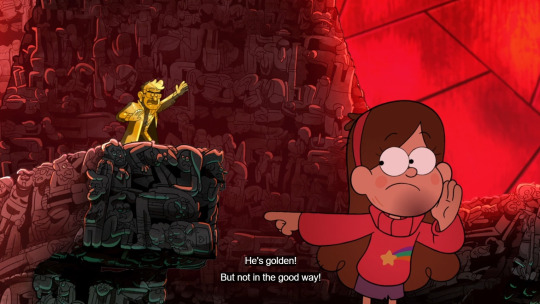
Which kinda sums up their whole thing up pretty well? Bill gave him special treatment by turning him into a golden statue (similar to yellow ha ha), always holding him close, but, like... Dude. You still kidnapped a man and turned him into a statue and then threatened to kill his niece and nephew. I don't think it will change his opinion on you if he's the Most Pampered Hostage, Actually. I just don't think that we need to explore the relationships between characters as simply "Well, this character hurt the other one, so we shouldn't really think about why or what they feel personally, because what they did was bad, so there".
Bill & Ford interest me because they're a tragedy in motion. We can see that Bill and Ford mirror each other in a multitude of ways, and we can see that they both do have positive feelings towards each other at the time they meet, and we see that Bill very desperately wants Ford to be just like him in the unhealthy ways; the ways that make Bill destroy entire universes and compartmentalize it all, because maybe then, he can finally have the companionship he so deeply aches for. Bill and Ford both had tough, lonely upbringings, but Ford moved on from that "I don't need you" mentality. That's what saved him. Bill didn't, and that's what got him where he was in the end. I feel like that's just so much more interesting than Bill just being a flat entity that makes abuse Happen to Ford, just as another Event in his life. I mean, isn't it just SO much more interesting that Ford humanizes Bill, in a way? That Ford makes him- in Bill's own words- "sentimental"? That a chaotic dream demon has regrets and loves and favourites and connections? It's the same thing with Fiddleford & Ford, although, obviously, to a MUCH lesser extent than Bill & Ford. But you get what I mean, right? You know that Fiddleford and Ford are going to undo each other in the end, and the path to that downfall is... it's telling a story! I like the story of it all! I think that's what I've been invested in and intrigued by all these years- the story, the tragedy of Bill and Ford. No matter what form it takes.
(Plus, as tumblr user fordtato pointed out in their own essay (not tagging because this post is messy enough as is oh god), hey, Ford now has two incredibly queer-coded narratives, with one of them being about how he recovered and was able to heal from an abusive relationship. And, well, I think that's just neat.)
Anyways, that's the end of the post. Thanks for reading this long!
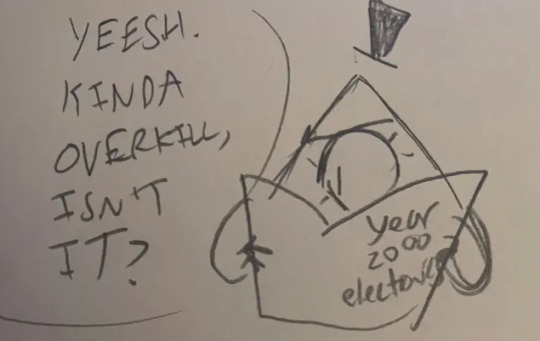
#gravity falls#the book of bill#bill cipher#billford#analysis#book of bill spoilers#gravity falls spoilers
596 notes
·
View notes
Note
Hi, Malu!! Could you recommend some books for getting into greek mythology?? Thnxx lov u <3
hii love you too!! I think I've got a pretty good lineup for you, mind you, I don't read much modern stuff, and I'm not well-versed when it comes to modern retellings, so this list consists mainly of classics
1. “The Iliad” and “The Odyssey” by Homer
these are foundational texts for understanding Greek mythology and culture. deeply human, capturing the struggles of gods and mortals alike. try translations by Robert Fagles or Richmond Lattimore for a balance of poetic beauty and readability.
2. “Theogony” by Hesiod
this is essentially the origin story of the Greek gods—where they came from, their power struggles, and how they shaped the cosmos. a must-read if you want to understand the structure of the mythological world.
3. “The Library of Greek Mythology” by Apollodorus
a concise, encyclopedic compilation of myths, perfect for getting a broad overview of the major stories and characters. it’s like having a handbook for all the drama.
4. Plays by Euripides, Sophocles, and Aeschylus
if you want to see the myths in action, Greek tragedies are essential. start with Euripides’ Medea or Sophocles’ Oedipus Rex for raw, emotional storytelling.
5. “Metamorphoses” by Ovid
though Roman, Ovid’s poetic retellings of Greek myths are stunning and heavily influenced later interpretations of these stories. his version of the myths adds layers of beauty, tragedy, and transformation.
6. “Bulfinch’s Mythology” by Thomas Bulfinch
a beautifully written 19th-century retelling of Greek myths that feels classic but remains accessible.
I think these are good cornerstones—no fluff, just timeless stories steeped in ancient drama and grandeur. you might need some time to get used to the writing or really understand the whole lore, but take it slowly because it's definitely worth it!! <3
#malusokay#girl blogger#askmalu#classics major#classic academia#classics#ancient greece#mythology#classical studies#classical literature#dark academia#booklr#books#reading#books and reading#bookish#bookblr#literature
165 notes
·
View notes
Text
Thoughts About the Potential Underlying Hidden Tragedy of Yanqing and Jing Yuan
that isn't just the "Yanqing will have to kill Jing Yuan eventually" red flags.
A relatively longer-ish post so thank you for bearing with me if you choose to do so!
I'd already been thinking about this whole mess of thoughts for a long while now, and so have other people, but the urge to write this came from a comment I saw on a post that mentioned how Yanqing had lost to "Jing Yuan's ghosts" and overall how it contributes to the dynamic of them being mentor/mentee + father/son. While the narrative seems to be leading to "Yanqing having to strike down a Mara-stricken Jing Yuan," there's just enough weird points that stick out to the point some alternative outcomes for Yanqing and Jing Yuan's fates to play out.
And while I anticipate HSR to follow that most expected point, I feel like there's enough there that could lead to a subversion or something more likely than that, an additional twist to the knife alongside the expected point.
Jing Yuan's Flaws as a Mentor and Father-Figure:
While most of us love the family fluff, I'm pretty sure we can all acknowledge the issues in Jing Yuan's approach and decisions in regards to Yanqing. Yeah, this is a fictional space game story where it's likely they aren't going to delve into the consequences of having someone as young as Yanqing be a soldier, there seems to be something there regardless. Like the brushes with death that he has and how we see him have to worry about the Xianzhou's security as a teen due to having a higher position in a military force. This is all set up for more of a coming-of-age type narrative for him, which HSR has done amazingly so far, but there are a lot of chances for this to explore something darker.
Among official media, the one time I could even remember the term "father" being used in relation to Jing Yuan is in Yanqing's official Character Introduction graphic:

Another notable thing that we see here is how we do have moments where Yanqing expresses thoughts and questions about his own origins and birth parents. The fact that even here, he wonders if the general is hiding something from him, sets off some alarm bells in my head. But he then brushes that off because he's always been with the General and Jing Yuan accepts him for who he is (which under the theory that Yanqing originates/is connected to the Abundace adds a whole heavy layer (this will be discussed in a later section)).
Yanqing does something similar in his texts:


As Huaiyan says to Jing Yuan:
"Yanqing can understand your concerns."
Alongside Yanqing generally being a considerate and polite boy, it can possibly be said that his eagerness to share Jing Yuan's burdens not only stems from his own gratitude towards him but possibly also Jing Yuan's distance.
As in, Jing Yuan doesn't really express his feelings so blatantly, and what we can clearly tell from when Yanqing first met "Jing Yuan's ghosts," neither does he speak much about his past too on a personal level. In Jingliu's quest, Yanqing says that Jing Yuan simply told him to forget everything he saw that day.
For Jing Yuan, the loss of the quintet is a grief that feels fresh in his heart, especially with echoes of them running around him. This is in the description for "Animated Short: A Flash":

(Will also talk about this in a different section)
While Yanqing learns about his General's past in a more direct manner (aka the people involved), it's sad how avoidant Jing Yuan is at times. While he's never been a upfront person, especially in the case of solving problems, I wonder if HSR would go as far as to show the negative side of that in terms of raising and teaching Yanqing.
History Repeats Itself (Sometimes It Don't Need A Reason):
+ the Jingliu parallels
Following up on that last image, Jing Yuan, especially in A Flash, has that whole "history repeating itself" thing going on for Jing Yuan. It points to Yanqing having to take down Jing Yuan but it also comes with a lot of its own possibilities and meanings.
It's blatant that Yanqing parallels Jingliu to an unsettling degree. Anyone who personally knows Jingliu and meets Yanqing sees her in him. Jingliu probably sees herself in him as well. Beyond powers and passion for the sword, her Myriad Celestia trailer shows that her principles before getting struck with Mara were the same as his. But it took her losing her dear friends in such a cruel and brutal manner (alongside how long she'd been alive) for all of that to fall out and form the version of her we see today.
And while it seems that Yanqing is deviating from Jingliu's due to the teachings he's learning, especially with Jing Yuan's effort, I feel like there's still a chance for things to go so wrong and mess with that. Yukong's line about him strikes me as concerning:
"A sword will vibrate and beg to be unsheathed if it is unused for too long... Once unsheathed, it will either paint the battlefield in blood, or break itself in the process..."
Even though I don't think HSR will go down a route of tragedy with Yanqing, like say, he gets Mara struck somehow or killed because that's not how Hoyo's writing has fully gone for playable characters (Misha and Gallagher aside in terms of death). Even in the most despairing parts for Hoyo's games, they're usually outlined and tinged with hope in one way or another. It's just that with what's been presented, there's got to be more here than meets the eye.
Yanqing's Origins - The Breaking Point:
From what we've been given, I think the number one thing that would have the potential of shaking Yanqing's entire sense of his life and the reality he lives in is learning where he comes from. Where he actually comes from has been a strange mystery since the beginning, how Jing Yuan getting him being recorded in the military annals of all places.
As shown from the screenshots of Yanqing's texts, he doesn't know and tries to brush it off because he's happy with Jing Yuan now. The choice to have this aspect here leaves a lot to ruminate on. What is Jing Yuan hiding? And if he really is witholding information, does he ever intend to tell Yanqing? If he doesn't and Yanqing finds out, how will it play out? And even if he does mean to tell him, depending on the severity, how will Yanqing take it?
It's why the theory that Yanqing is connected to the Abundance, possibly even coming from it directly, is as harrowing as it is.
With his arc in mind, will his development be enough to sustain him when he does find out the truth? If he finds out sooner than he should, will he be able to rise above it? And what of Jing Yuan? If confronted with a situation that's outside of his control again, what will he do and how will he react?
The potential in that scenario is so fascinating to me, because we can all anticipate the absolute gut punch that Yanqing killing his master would be. It fits Hoyo's writing style of something so sad but having a hopeful end for the future type beat. But the idea of that being twisted, that expectation being flipped on its head, could be so agonizing. It's not a narrative we see too often explored, at least in my experience, so maybe that's why I'm brainrotting over it so much lol.
#honkai star rail#hsr yanqing#jing yuan#hsr theory#character analysis#yanqing losing jing yuan is one thing but jing yuan losing yanqing is another lol#i really don't think hsr would do it like that but it'd be wild if they do#at most they're gonna do something that really fundamentally changes them as people haha#new form yanqing perhaps? haha ha#mara struck or abundance form yanqing would be devastating lolol#struggling jpg thinks
154 notes
·
View notes
Note
Why does DC hate Jason Todd so much??? He's literally Babey!!! 🥺
You probably aren’t me expecting to respond to this factually but fuck it here we go. Because he was a little rat fuck who replaced their favorite Robin character for a shitty carbon copy.
I wasn’t in the comic scene, or alive, when that happened in comics, but Jason originally was a carbon copy of Dick. He grew up in a circus, was in an acrobatic troupe called the Flying Todd’s, and his parents died by the hands of Two-Face.
The next Crisis had his backstory changed but the fans still viewed him as the bad Walmart version of Robin.
(For the readers:)He was a shitty replacement for Dick Grayson that had been Robin for so long and readers didn’t like the new guy taking over the role.
He doesn’t have a memorable Robin stand-alone series, he was uncharacteristically ruthless for a robin, he replaced Dick and didn’t have any of the Grayson charm that made Robin so loveable, he was arrogant at times and bashed in general. People wanted Dick. Not this other guy.
Nowadays why they hate him?
Simple and yet layered reason:
He went from a very wonderful villain in the comics and got later boiled down to an anti hero. Most people I know that dislike Jason now preferred his villain arc. I prefer it too honestly but if we didn’t have anti hero Jason, we wouldn’t have the interactions he has with the batfamily at all and I really enjoy those scenes in the comics.
His characterization is all over too. He goes from absolutely batshit insane in some comics to angsty ninja boy, to essentially a little bit feistier Ric Grayson (I’m so sorry it’s my take DC fans please don’t fight me).
Also, his death was a BIG thing in comics and him coming back ruined the meaning behind his death.
Back in the day there were three deaths in comics that always happened and never changed. They were deaths that grew other characters around them. Those three were:
- Bucky Barnes from Captain America
- Jason Todd from Batman
- Uncle Ben from Spider-Man
Their deaths hold major stepping stones to character arc changes and how the main character acted for the rest of the comics. They were always the main characters greatest tragedy and a core part of their lore.
Of course two of these are now changed. Bucky Barnes is back as the Winter Soldier and Jason is back as Red Hood.
But that death was sacred for a while. For 20 years he was dead. He was Batman’s greatest tragedy. You did not fuck with Batman’s greatest sorrow. And they did it after (incel) Superman Prime punched the universe so hard Jason Todd came back to life.
Additionally, lots of comic writers just don’t fucking want to deal with him. Same with Damian I feel like. They throw both under the bus because they’d rather be writing other characters.
Most of this is my observations but if anyone else has any other comments to add feel free.
713 notes
·
View notes
Note
You've said Ultrakill is one of your favorite games-- I'm curious what your favorite part of it is... the lore's great, the weapon pool is just. mmm, the enemies and level designs. incredible.
the way it does difficulty? has to be my favorite part. i love how i can just. go do something thats a little bit harder. get a slightly better time, get a slightly higher wave, add an additional modifier like radiance or a self-imposed weapon challenge, and p-ranks all make for the perfect difficulty curve that has lasted me over 600 hours
so with that lil infodump, i bring it around to the beginning question-- what's your favorite thing about ultrakill?
There is MANY things I enjoy about ULTRAKILL... but my favourite?
I think generally, it is the lore. I'm gunna go under a read more here just in case. But to add to it- Gameplay is incredbile, even if I'm not very good at it.
The weapons? Hilarious. Looney tunes ass shit that somehow exactly fits the games aesthetic and style. How it merges comedy perfectly with tragedy and serious moments.
But anywho! Under the read more for some ULTRAKILL spoilers.
I am... quite frankly abnormal about how V1 is not the main character. That this is a game about Gabriel, at the end of the day. How every major change, every major importance, comes from his decisions in the end.
I'm already a big lover of playing with religion. One of my TTRPG characters who I have yet to play is a priest going through some real shit. There is so much you can do with religious guilt and the things that bind and ULTRAKILL plays with that like building blocks, it fucks.
The creativity of how each of the layers of hell is depicted is also? MWAH. perfect. PERFECT. seriously, I have never seen a game just play with its concepts like this before. The enemy designs also go hard.
I just really enjoy its lore conceptually. Breaking away from something thats been chaining you is always something I find hard to be invested in- especially if the character, Gabriel in this case, is very much like "No, I can't be feeling this way, there is something wrong with me."
It's just good. ULTRAKILL is good. Fraud WHEN.
#asks#ultrakill#this is big rambling and im not checking over this but op you also have great taste! i also enjoy all of the things you've mentioned here#i am NOT good at ultrakill#my first ever shooter was Splatoon 1 and im not very good at playing shoot games in general but i enjoy them!!! ultrakill is great#both with its accessibility and its just fun to play tbh
87 notes
·
View notes
Note
Like I do genuinely think they maybe should have replaced Radahn’s appearance with Godwyn’s instead? I know his soul has been slain, but I just like the idea that even the kindly Miquella is still on this naïve journey to become a god and bring back his dead brother to become his lord who honestly wouldn’t really be the same and would probably just be a husk of Death incarnate itself, but he wouldn’t care because he’s still grieving for him.
With that being said, the whole Metyr lore was super good, the whole reveal that the two fingers actually don’t really know what’s going on and they’re kinda just pulling shit out of their ass just adds a whole layer to the tragedy of the game, like all of these events were really for nothing and it just makes the Frenzy Flame ending and Ranni’s ending more understandable
ehhhh I absolutely see where the “it should’ve been Godwyn” mindset comes from and I agree with a lot of the arguments to an extent, but I’m not sure bringing back Godwyn’s soul entirely works for me?
I think Miquella’s attempts to return Godwyn’s soul were always going to fail, because his soul was completely and permanently destroyed by Destined Death. The ending to Gurranq/Maliketh’s quest is basically that things can never be the same again, so I don’t think there’s really a way to bring back Godwyn’s soul without it feeling like a contrivance? I really like the fact that he’s a character who can’t ever be brought back; his death was the catalyst for everything, a point of no return. Godwyn not being able to come back gives Ranni’s actions a special weight, that she was willing to permanently destroy his soul if it meant being free from the Two Fingers.
But with that being said, I absolutely see the sense in saying that Godwyn should’ve been Miquella’s lord. What’s strange to me is that Godwyn was set up in the base game to be a beloved older brother figure to Miquella — there’s the statue of him with Miquella and Malenia at the Haligtree, there’s the Golden Epitaph with Miquella’s prayer that he might die a true death, and there’s the spirit at Castle Sol, implying it was Miquella’s intention to return Godwyn’s soul through the eclipse. And now the DLC says that Miquella always looked up to Radahn as an older brother, when this relationship was never even hinted at in the base game, so it ends up feeling out of nowhere. If Radahn was always the one Miquella envisioned as his consort, then why is Godwyn the only brother he’s ever shown to have had a significant relationship with?
And, it’s also true that Godwyn ending the war against the dragons with diplomacy and bringing about peace really embodies what Miquella would consider admirable, since his quest in the DLC is in part to heal the hurts caused by Marika’s war of vengeance long ago. Radahn, on the other hand, is known for idealizing Godfrey, who helped Marika enact her wars of conquest, and for loving conflict so much that he literally fought the stars themselves. Miquella was said to have admired Radahn for his strength and kindness, but there aren’t really any instances showing Radahn being renowned for his kindness, except for his love for his horse? (the loyalty of his soldiers doesn’t count. Rykard had die-hard soldiers too and we know what he’s like)
On the other hand, I feel like Radahn as Miquella’s consort works thematically as a concept because Miquella’s journey in the Shadow Lands mirror’s Marika’s own ascent to godhood, and Radahn is like Godfrey’s spiritual heir. I’m also compelled by the idea of Miquella idealizing a young Radahn for his strength and kindness, only for Radahn to become corrupt during the Shattering, warring for the sake of war… which is why Miquella brings back specifically the young version of Radahn whom he idealized. It’s like a vision of Radahn colored by a child’s naïveté, and it belies the irony of beginning an “Age of Compassion” with the demigod who idealized war the most at his side. I think all of this makes for a more interesting story than Miquella somehow bringing back Godwyn’s soul.
BUT I still believe that this story was not developed enough. Again, we don’t SEE enough of Radahn’s relationship to Miquella hinted at beforehand, so this FEELS like a cheap plot twist. Godwyn was the one with the established relationship to Miquella in the base game, so it being revealed that Radahn was actually the one he always wanted to be his lord is like… huh? since when???
anyway I also really loved Count Ymir’s quest and the revelations about the Fingers… the Two Fingers say that the Greater Will hasn’t abandoned this realm, but I think it’s clear now that they’ve been without the Greater Will’s guidance for a long, long time. Since we know Count Ymir was Rellana’s teacher, I wonder if his distrust in the guidance of the Fingers somehow came to influence Ranni?
117 notes
·
View notes
Text

propaganda:
They. Just... THEY! It's a funny ship, but is also one that actually helps to explain Alfred's whole THING a great deal better than if they weren't in a relationship together! Alfred may have gone to butler school but it's not really what he ended up doing in life, nor something that he really wanted to do with his life. Alfred actually does a number of things that would be considered EXTREMELY unprofessional for him to do as a butler. But as Thomas and Martha's bestie/lover who also knows a great deal about cooking and cleaning because he went to butler school once...? Why, they wouldn't keep him around if it wasn't for his sarcasm and unprofessional behavior! Plus the whole butler act comes with getting to dress Alfred up in a bunch of cute, handsome, and VERY flattering outfits! (After Bruce was born, they decided to retire the maid's outfit... Temporarialy... They thought it might be a but much to introduce little Bruce to.) And Bruce and the Wayne family fortune going to Alfred, /the butler/, in the event of their deaths!??? CLEARLY Alfred had to have been more to them than JUST their manservant when there were plenty of other candidates for Bruce to have gone to after their deaths! This ship is just taking that to its logical endpoint. More than a servant... Their closest confidant and friend... Who lived in their house with them... And knew their every secret and trusted them to him in confidence... A butler so beloved that they gave all of their wealth and son to him in their wills... Well... Something is going on here, and it sure as hell doesn't smell monogamous! But gotta say, LOVE that for Alfred! Alfred is the BEST! Period. And he deserves the best! And being the lover to Thomas and Martha? Can't get much better than that! You know... other than the tragic murder... But it also just adds another layer of tragedy onto the pile! That was Alfred's husband and wife right there! He saw them only a moment before... The man and woman he thought that he'd be spending the rest of his life with... Gone in an instant. Leaving their traumatized son behind... We all know that Alfred is more than just a butler to Bruce. Alfred is in every way Bruce's father. Bruce could never fire him, even if Alfred is unprofessional and uncouth at his 'job.' And clearly Bruce is more to Alfred than just someone he works for. Bruce is his son. So why not make Bruce his son in more ways than one? Alfred loves the Waynes in all of the ways! He's the glue that keeps them together and sane! And that can include Thomas and Martha! If DC weren't cowards, they would make it canon! Alfred can be bi and poly. As a treat!
147 notes
·
View notes
Text
Dissecting the Misconceptions Surrounding Connor/Ratonhnhaké:ton

Hey there, fellow Assassin’s Creed enthusiasts and lore lovers. I’ve been working on a composite post to untangle all the misconceptions, misinterpretations, and half-truths about Connor/Ratonhnhaké:ton, his journey, and his role in Assassin’s Creed III. This character, his story, and his motivations are so often misunderstood or overshadowed, and it’s high time we give him the depth and clarity he deserves.
Here’s some of what I want this post to cover: Connor’s Identity as Ratonhnhaké:ton • Breaking down the duality of his identity as both a Kanien’kehá:ka man and an Assassin.
• The cultural nuances of his upbringing and how they shape his worldview.
• Addressing common fan assumptions about his “stoic” demeanor versus his actual emotional and passionate core. --------------------------------------------------------------------------- Connor’s Relationship with Other Characters
• His dynamic with Achilles: mentorship, respect, and generational misunderstandings.
• His complex relationship with Haytham Kenway: trust, betrayal, and tragedy.
• His role in the Brotherhood and how it reflects his ideals of justice and freedom. -------------------------------------------------------------------------- Historical Context and Its Role in His Story
• Exploring how ACIII depicts the American Revolution through Connor’s eyes.
• Dissecting the balance (or imbalance) between historical storytelling and Connor’s personal arc.
• How Ubisoft’s narrative decisions impact how players perceive his importance to the overarching story. -------------------------------------------------------------------------- Misinterpretations and Fan Perception
• Tackling the "boring" label and where that perception comes from.
• Why Connor’s moral compass is so important, even if it doesn’t lead to the “flashiest” decisions.
• How his unique position as an Indigenous protagonist adds layers to his narrative that are often overlooked. -------------------------------------------------------------------------
Connor’s Legacy in the Assassin’s Creed Universe
• His influence on the Creed, especially regarding justice, truth, and freedom.
• Where he stands in comparison to other Assassins in the series.
• What the fandom can learn from re-evaluating his story with fresh eyes. ----------------------------------------------------------------------------
This isn’t just my project—it’s a collective effort to shine a light on the richness of Connor’s character and story. If you’re passionate about this topic, message me or reply here. I’d love help with research, writing, or just brainstorming ideas. Whether you’re well-versed in the series or love deep dives into narrative analysis, there’s space for everyone in this project.
Let’s give Ratonhnhaké:ton the attention he’s always deserved.
#assassin's creed#connor kenway#ratonhnhaké:ton#assassin's creed 3#connor ac3#ac3#haytham kenway#achilles davenport#american revolution#colonists#founding fathers#nativeamericans#iroquois confederacy
47 notes
·
View notes
Text
PLEASE PLEASE PLEASE, let's talk about Nerites and Poseidon. The myth of Poseidon and Nerites is one of the more obscure stories from Greek mythology, but it stands out as a deeply emotional and intriguing tale that highlights a different side of Poseidon—one that is rarely explored. Poseidon is usually depicted as the tempestuous god of the sea, known for his anger, destructive power, and relentless pursuit of lovers. But in the case of Nerites, we see a much gentler, almost tender version of the god, one who is capable of love that isn’t about conquest or dominance. This myth, though not as widely known, offers a refreshing perspective on Poseidon and the complexities of divine relationships.
Nerites was a sea god known for his unparalleled beauty. Living in the depths of the ocean, he attracted Poseidon’s attention. What makes this story different from many of Poseidon’s other romantic pursuits is the element of choice and mutual respect. Poseidon was so enchanted by Nerites that he offered him the chance to join him as his charioteer on Mount Olympus, effectively offering him immortality and a higher status among the gods. This is significant because, unlike other myths where Poseidon is forceful or demanding, here he offers something to Nerites. There’s an implicit respect for Nerites’ autonomy that stands out in the broader landscape of Greek mythology.
Nerites, however, declines Poseidon’s offer. Whether it was because he didn’t want to leave the ocean or because of a deeper emotional connection to his life in the sea, we don’t know. But the fact that Nerites chose to stay is important—it shows that love doesn’t always mean ascent to power or higher status. Nerites was content in his life as it was, and Poseidon, despite being a god who could have easily forced his will, allows him to make this choice. This sets their relationship apart from many other god-mortal dynamics, where the god typically exerts control. The fact that Poseidon doesn’t punish Nerites for his refusal is remarkable—there’s no act of vengeance or anger, which would be typical of Greek gods who are often portrayed as vengeful when spurned. Instead, Poseidon accepts Nerites’ decision, which speaks to a deeper emotional maturity and connection in their relationship.
The tragic end of the story adds a layer of poignancy that makes it all the more memorable. In one version of the myth Helios, the sun god, becomes jealous of Nerites’ beauty and transforms him into a sea snail. This act of jealousy by another god emphasizes how desirable and important Nerites was, not just to Poseidon but in the divine world as a whole. Even after this transformation, Poseidon remains connected to Nerites, and it’s implied that Nerites continues to live in the sea, in some form, forever tied to the ocean and, by extension, to Poseidon.
What’s so compelling about this story is how it subverts many of the expectations we have about Poseidon. In most myths, Poseidon’s relationships are marked by violence, aggression, or manipulation. But with Nerites, we see a god who is in love, not with the idea of domination, but with someone’s beauty and spirit. He doesn’t force Nerites into a role he doesn’t want—he offers and respects the choice made. The tenderness of this story, coupled with the tragedy of Nerites’ eventual transformation, makes it stand out in Greek mythology as a rare example of Poseidon’s vulnerability and affection.
Additionally, the myth of Poseidon and Nerites introduces a same-sex relationship within the Greek pantheon that doesn’t get nearly the recognition it deserves. Many of Poseidon’s other relationships overshadow this one, but the connection between him and Nerites adds depth to Poseidon’s character and challenges the more traditional portrayals of masculinity and power among the gods. In a mythological landscape that often focuses on heterosexual pairings or uses same-sex relationships as a way to emphasize power dynamics, Poseidon and Nerites’ story feels more balanced, driven by affection rather than control.
The tragic end only adds to its poignancy—Nerites remains part of the sea, in some ways always with Poseidon, but in a transformed, more distant way. This transformation is symbolic of how love and beauty can be fleeting, and even the gods are not immune to loss. Poseidon’s relationship with Nerites may not have the grand tragedy of The Iliad or the intensity of Medea, but it’s a quieter, more introspective tale of love, choice, and the inevitability of change. It deserves to be remembered and appreciated as a unique and tender narrative within the vast canon of Greek myths.
In short, Poseidon and Nerites' relationship offers a glimpse into a side of Poseidon that is rarely explored—one that is more complex, emotional, and tender. It’s a story of love not rooted in power but in mutual respect and affection, which makes it all the more special.
53 notes
·
View notes
Note
sodapop patrick curtis thoughts on my desk by the end of the week or ur DONE /j
How I feel about this character
Uh like he’s perfect and should be my wife i think
Nah but fr Soda’s one of my favorite characters ever. He’s sweet and all, but he’s so much more than that. Pony says he’s movie-star handsome, that he can go from gentle one minute to “blazing with anger” the next, that he gets drunk just on living, and understands everybody. Soda’s a Kerouac-style “mad one”- “mad to live, mad to talk, mad to be saved, desirous of everything at the same time, the ones who never yawn or say a commonplace thing, but burn, burn, burn like fabulous yellow roman candles exploding like spiders across the stars and in the middle you see the blue centerlight pop and everybody goes Awww!”
He’s a guy who’s sensitive but strong, a “bawl baby” who’s tough, he’s probably got ADHD and dyslexia, the school system failed him. His folks died and left him holding his brothers together by a thread. He’s pretty but not pretty enough for Sandy to stay. He might end up dying in Vietnam, and thank God that isn’t canon, but it’s still there. He’s happy to live life simply, behind a white picket fence with a wife and kids- hell, he’s thrilled to. But that’s not gonna happen, at least not for a while, because Soda is a tragedy. But he loves his brothers and his friends so much that he becomes a beacon of hope despite it all.
I love Soda. Honestly, this barely scratches the surface of how I feel about him. I haven’t even touched on the adrenaline junkie stuff or the ways he’s sometimes so relatable to me that it hurts.
All the people I ship romantically with this character
Steve, and sometimes Evie.
I’ve found I’m a friends-to-lovers enjoyer, so Stevepop scratches that part of my brain lol. To have someone who’s got your back through thick and thin, aware of your flaws but in spite of them- well, ain’t that the dream? The angst of it being the 60s makes it interesting to me too, because there’s a lot of ways to handle that. Man, when I first read the book I didn’t get the hype for them at all, but idk. It clicked. I get it now.
And then Steviepop is my roman empire lol. It’s all I love about Stevepop, but Evie adds even more complexity. I like her a lot and I love writing her, and I love writing her with characters who I also love. There is absolutely no canon anything to back this ship up. But dammit that’s the point of fandom.
I will say though that I like exploring Soda’s dynamic with Sandy, but I don’t really ship them. I think the fact that Sandy left him (and I mean cheated on him, even if that can be read ambiguously) implies that there’s something about him that could be undesirable, romantically. I don’t mean cheating is good or that people deserve it, just that in this case, the idea that Soda’s an imperfect boyfriend adds layers to a character who is mostly just positives. We’ll never know Sandy’s POV on it, and I don’t think Soda will either. Sandypop to me will never have closure. That’s what makes it hurt so much. That’s what makes it relatable
My non-romantic OTP for this character
I mean honestly? Steve. I know this isn’t really fair, since I like Stevepop and all, but idk, there’s no one else who I think it could be.
Steve’s a character who’s cocky and troubled and prone to assholeish-ness, but even he loves Soda. He knows about Sandy and gets angry on Soda’s behalf at Pony for mentioning her, which means Soda can tell him- angry, tough Steve Randle- about sensitive stuff. And Soda, who I think is a little in love with everyone he meets and could have anyone he wants, sees this bastard and sticks with him. He sees the parts of Steve that Pony can’t. Parts that make him worthy of being his best buddy.
It’s been said before, but no matter how you look at it, romantic or platonic, they’re each other’s person. I don’t think I could put anyone else in this slot.
My unpopular opinion about this character
I have a few lol.
1- I see a lotta fics and takes where the whole “drunk on living” thing is a lie Soda feeds Ponyboy, and while I like that take, I do also think it’s totally possible and even plausible that Soda really doesn’t drink and Pony’s view of him (in that aspect) is right.
I dunno, I mean, I know firsthand what it’s like to just get drunk on adrenaline/excitement. Adrenaline is a hell of a drug, and the rush from it is better than any other high I’ve had. Thrill rides make me act as stupid as someone drinking- when I’m excited, I lose all ability to filter thoughts or fight impulses. I’ve done all sorts of dumb moves- climbing onto tables, singing loudly without knowing or caring if it bothers people, play-fighting my buddies so hard we both get genuinely injured, standing up in a convertible going down the freeway... (This is obviously anecdotal and not real evidence or anything, but like, duh. This is an opinion piece lol.)
I guess what I’m saying is that there’s a lot of interesting things that can still be done with a Soda who genuinely doesn’t drink. (Or at least not much.)
2- I love darker takes on Soda. I love when people dig into his addictive personality, his temper, his relationship with his looks/self image, all that stuff. I love his flaws, and I especially love when they co-exist with his earnest sweetness and genuine sensitivity. In a few of my fics, I’ve explored some slightly darker Sodas- Sodas who are impulsive, pent up, semi-narcissistic and occasionally manipulative. I haven’t delved deep into it or anything, and I usually keep his character wholesome, but I love it when other folks don’t.
3- I actually really like the Vietnam War storyline. I mean it hurts, but it seems plausible. I hate the idea of him dying there, but I like exploring the idea of him being drafted. Hell, maybe he even enlisted. The military is known for being a good way to earn enough money to pull one’s family out of poverty, and this paired with the flawed ideas of masculinity and strength of the time lead to a really interesting version of Soda’s future.
I’m real glad it isn’t canon though.
4- This isn’t technically unpopular but brown eyed Soda will always be canon to me. I like Rob Lowe’s Soda a lot but man….he coulda used brown contacts, yk? /hj lol
One thing I wish would happen / had happened with this character in canon.
Well I still think it’s a crime his emotional monologue got cut outta the original version of the film. Thank God for the full novel version, but man, still.
Woulda also have been cool to see him mentioned in That Was Then This is Now, but I get that SE Hinton wasn’t trying to make an Outsiders sequel really.
Idk, Soda served his purpose, I think.
tl;dr- I love him
#sodapop curtis#the outsiders sodapop#soda curtis#the outsiders#the outsiders 1983#stevepop#rambling#ask game#ask#sodapop curtis my beloved#i actually initially wanted to dislike Soda when I first read the book cos his description annoyed me#(i was newly 15 and was jealous of all boys prettier than me which is /ridiculous/ to admit but whatever)#…but i couldn’t dislike him even when I tried. he’s just so…/good/. idk soda’s such a great character#maybe not the most plot-important but he makes the book so much better just by existing. it wouldn’t be as good without him.#ALSO sorry this took a minute to reply to anon! I love Soda and I had to do him justice yk?#long post
32 notes
·
View notes
Text
Elden Ring SOTE and its consequences have been a disaster for the human race
//j (spoilers ahead)
I'm gonna be honest initially my opinions on the story were pretty mixed, and while that still is the case in some respect, the overall story and its implications have grown on me and made me like certain characters (mohg, malenia, radahn) even more, and add a layer of tragedy to what we know about them from the base game. while i am aware the story overall was forced to bend by the gamedev crunch, I think FS did a good job with the time and resources they had available.
caveats of this post: obviously going to be colored by my own opinions and views I've held abt the story since abt march 2022: that being, Marika is a Nashandra parallel through and through, and Miquella is a benevolent but manipulative hypocrite - "Path to hell is paved with good intentions" the character. I'm aware there's plenty of discourse about the interpretations of these characters but just remember: I have never been wrong ever in my entire life <3
Malenia, despite her overall lack of appearance in the DLC, I personally feel the most about given certain... revelations.
Malenia is a character who has always lacked true agency, lived her life in a state of fighting against the inevitable and looking up for anything to alleviate her suffering and help her push through the sheer horror that was her fate. Very much a white-knuckle-gripping the dirt while drowining in her grave kind of character.
And so... SOTE reveals that Miquella was willing to sacrifice her. It reveals that for all his posturing, his leaving the golden order because of her, Miquella was fully willing to throw his own little sister who looked up to him as a lord and savior, to the wolves. He was willing for her to become the thing she hated most, was willing to order her to do it even, if it meant his plan would inch one step closer to fruition. In sending her to fight against Radahn and which consequently led to her bloom and ultimate decay. and it didn't even work. Malenia lived and fought and died never knowing that her ultimate mission was a failure, that in her blinding loyalty, much like her father's, she destroyed herself. The fearsome "Blade of Miquella" herself, and the dream of her healing she had once shared with her brother, was discarded as easily as a butter knife.
Radahn, on the other hand... man. Isn't it funny how upon being told that Miquella awaited him in his death, the man straight up refused to die for centuries? The entire Radahn festival becomes recontextualized once you realize that Radahn would rather let himself become a rotting, shambling, mindless corpse before he allowed himself to become a part of Miquella's plan. I know some people think he was willingly taking part in the vow - but remember, Radahn had to die for the vow to be fulfilled, as we learn - and knowing everything we do about him - would Radahn abandon the Redmanes, Sellia, the entire Caelid, the land he fought the stars over - would he let them be destroyed for Miquella? He gains absolutely nothing from that transaction.
I get discourse-y here but his death is anything but a warrior's one, if you take that to be the promise Miquella made to him in return. Perhaps in the grand scheme of things, you could say that you're putting base game Radahn to rest, but with the context of the DLC, you're subjecting him to a fate worse than death.
Mohg. Not much to say abt him I'm just really happy Mohgposting is legal now <3 Free my man he did nothing wrong the blood cult was based and mohgpilled actually.
68 notes
·
View notes
Note
Something that's so so interesting to me in Funger 2 that I don't see discussed much is that both Needles and Stitches can do a form of Sylvian magic.
Like. When Needles first defeats you and assaults you via red heroin ghost hallucination, you can be cured of status effects, including withdrawal. The only other way to cure withdrawal (from what i remember) is Magna Medicinal. So, healing though sex magic.
Stitches can use Loving Whispers and creates things very reminiscent of Marriages.
So Daan didn't just teach Eihner about Sylvian, but Elise as well. Enough to where they (or at least Elise) have affinity with her.
With the apparent cut scenes/being able to play through their backstories in the update, I really hope this is expanded upon!
Also... it's mentioned that Daan tried "unspeakable methods for days" to bring Elise back, which makes me go 👀👀👀👀
Sorry about the rant. The Autism won.
I definitely think Daan taught Elise about Sylvian magic and I think on some level, her interest in him was partially due to his connection to it. Her "inventions" show a pretty clear obsession with creating life, which is the thing Sylvian of all gods and creatures is most known for. I wouldn't be surprised if Elise was experimenting with Sylvian magic far before Prehevil, though I'm not sure if I think Daan knew about it or not. His disgust with the gods and Sylvian magic and his reverence for Elise make me think that he would have had no idea. I also think it adds an extra layer of insidious tragedy to him finding her in Prehevil because not only has she come back as something horrible, but she's come back with evidence that she was using the same magic that traumatized him and he probably confided in her about.
As for the "unspeakable things," I have SO many thoughts on that that I don't even know where to start honestly. Daan's original concept was as a Jack the Ripper inspired character and I always use this as evidence of my infertility theory with him, but I also wonder if it could point to a potential idea of what he may have done to bring Elise back.
Also!! Elise being stitched together is something that I definitely think was the work of Daan. We of course know that Elise also has an interest in sewing, but I think it was Daan that stitched her back together for a few reasons. 1.) I think it was some attempt at getting her corpse to be usable for a revival ritual, even if she had died long before he returned. 2.) She is missing the opposite eye as Daan, which I don't think is a coincidence. 3.) When examining Stitches' corpse as Daan, the only stitches that he points out as being self inflicted are the ones across her mouth (which I actually think we see her do in game?), but he doesn't comment on her limbs or face being sewn together. Also, he recognizes Elise much more quickly than he does Eihner and seems more bothered by seeing her than by what she's become.
30 notes
·
View notes
Text
"All shall love me and despair"
In seasons 1-3 of the rings of power, I think this is what sauron is doing. He wants to be seen as the source of salvation (Lowden sauron explicitly says this). He wants middle earth to love him. I believe this is why he is so desperate to get galadriel on his side, because this love will be easier to achieve with her light.
However, I think in seasons 4 and 5, numenor and after, we will see a shift to a sauron much more aligned with what we see in lotr. Something will happen that will make him finally realize he's deluding himself that he could ever be loved, and he'll resign himself to control and power through fear and violence, truly becoming morgoth's successor. (Bonus points if they really emphasize his actions on numenor as an attempt to make Eru pay attention to him/kill him)
While not redeeming or making him too sympathetic, this would add a layer of tragedy to his character and actually allow for a character arch. It would also smartly fully utilize vicker's amazing acting ability.
Now the show could just keep him stagnant and have no growth or change. It would be bad writing but I wouldn't be surprised since people have, time and time again, proven they have no idea how to write a good villain who isn't static (or they don't have the courage too)
31 notes
·
View notes
Text

In 1994, the Muppets made one of their most bizarre films to date.
An adaptation of Goncharov, a cult classic that languished in obscurity until the 2020s. While the film was referred to internally and in public reviews of the film as "The Muppets of Naples", the actual marketing of the movie instead titled it after its main lead: "Gonzorov". This was one of many enigmatic choices made by the production crew, and has never been elaborated on by the cast or crew. The film was a gigantic flop for multiple reasons, but most agree that the source of the troubles stems from the nature of Goncharov as a tragedy and a generally depressing movie to watch.
Reportedly, conflicts among the writing staff began almost immediately due to being unable to decide on which cut of Goncharov to base the film on. Eventually, however, director Brian Henson put his foot down and forced the writers to adapt the Ambrosini Cut. Generally agreed to be a less depressing movie than the Morelli Cut, it was expected that "Gonzorov" should have been a much more entertaining and narratively adept movie than it was. As the Muppets proved just two years later in "Muppet Treasure Island", they are very capable of handling otherwise dramatic material with aplomb. This leaves the question of why this movie was such a flop.
To quote Kermit the Frog during the interviews after the cinema debut, the movie was allegedly emotionally draining for the crew to adapt. "You know, we have a script. Mostly. But we do a lot of improv too. I'd wager it's about 60% script, 40% improv on a good day of filming. But, uh… We just weren't feeling it with this one, you know? We watched the original, and… Boy, it's really sad. Goncharov's just kind of a lonely guy trying to make himself a life. And it's not a good life, but it's his to own, and it ultimately kinda falls apart. Gonzo tried to make the role his own, but I think we all realised that we couldn't really make a joke out of the movie in the way that we wanted to."
The Muppets were skillful enough to change the genre to an absurdist tragicomedy, a film where the tragic and meaningless cycle of violence is paradoxically played for laughter. However, despite this, the film is well-known for its bizarrely melancholy air and almost hopeless atmosphere. Everybody seems thoroughly certain that their improv will have little to no impact on the film as a whole, creating a strange and compelling meta-narrative where not even the actors themselves can escape the almost gravitational pull of the ticking clock. Their characters will die, and any attempts to joke their way out of it comes off as desperate, almost deluded in a sense.
The original Goncharov held a deep fascination with inevitability. Clocks are the primary theme, though it appears in other forms. It is this same inevitability that strangles the Muppets, their impressive comedic skills held captive by their own belief that the narrative is inescapable.
Of particular note is the bridge scene, wherein Gonzorov and Katya (played by the dazzling Miss Piggy) discuss the slow collapse of the Italian mafia. The original Goncharov scene had Goncharov desperately trying to hold things together, even as they slipped through his fingers, but here… Gonzorov realises that it's pointless. He can't fix it, but at the same time he can't let it go. He begs Katya to shoot him. Cut to the chase. She's going to shoot him anyway, that's how the movie ends, right? Might as well go out on his own terms. But this horrifies Katya, and she throws her gun away, accidentally saving Gonzorov in the process.
This adds a new layer to the themes of inevitability that Goncharov is wrapped up in, and it's this: Inevitability goes both ways. You're going to die, but only when you're meant to. You don't get lucky. You don't have accidents. Inevitability is a ticking clock, but that countdown is a safety net. As long as you can still hear that clock ticking down, it means you've stitll got time to burn. When a bomb is counting down, just five minutes until it detonates, you do everything you can to buy yourself more time on the clock. Even if all your effort only gains you an extra second, that's what you have to do, right? A single second is worth the blood of innocent men.
But again, inevitability. That second you earned cost you minutes, cost hours days weeks months years. The clock WILL run out.
[read more]
79 notes
·
View notes
Note
what are your thoughts on rhaegar and lyanna?
oh i love them! there’s all this talk of them haunting the narrative and they do, but i’d take it further and say they are the black hole at the center of the story. the choices that they made, starting with lyanna’s decision to defend howland reed and what that meant to both him and rhaegar, who was very likely at his lowest point at harrenhal after the ruination of his careful plans, touched or changed the lives of every character and plot line in the series. the story itself is such a fun mashup of tristan and iseult, lancelot and guinevere, helen and paris, the fall of camelot and all of arthuriana really, the classic trope of the princess in the tower and the dragon and the knight: all of that in one couple and we don’t get to experience any of it with them. we can guess and speculate, but we can never truly know them. we experience their story only through the memories the people who survived the war they ostensibly kicked off, and those memories are all heavily colored by trauma, guilt, nostalgia—alternately faded and sharpened by time. it’s this incredibly fun and brilliant reconstruction of some of the most enduring tragedies in folklore and mythology and i adore it.
hate beyond articulation the way asoiaf.tumblr.edu approaches their relationship and the individual characterizations of both of them, though. just absolutely some of the most insufferably sanctimonious disingenuous decontextualized analysis i’ve ever experienced—much of that coming from people viewing this through a historical lense instead of a thematic one. like, imagine approaching the battle of the trident as “rhaegar is a bad person for fighting for his father who was evil! he lost the moral high ground with that one” as opposed to “rhaegar as a character exists to fail and die; he was the last dragon, carrying the unbearable weight of his family’s legacy and the burden of the prophecy for which they conquered westeros: the end of his life is the end of the targaryen dynasty. he must fail and he must die, so that dany and jon can grow up free of that weight and that power. daenerys gets to redefine what it means to be targaryen on her own terms. she and jon separately and unknowingly do the things that he thought he had to do—the things he was conceived and born to do—but never knew how: they do it because of their circumstances, because of the people that they have grown into, because they believe it is their duty, because they have the power to do it.” also, like, re: interpretations of battle of the trident, is there maybe another battle that occurs later in the series that is exactly the same thematically and contextually? where perhaps a character who was missing for a while shows up on the eve of battle, knowing that the opposition is right and their cause is just but that his family will die if he doesn’t fight with them? anything that adds an extra layer of meaning to what happens, aside from dany’s own connection—which is not as thematically similar but is still incredibly meaningful. like i certainly don’t think there’s any one interpretation of a character or story, but the worst ones are consistently applied to rhaegar.
and then with lyanna in particular, it’s like people cannot stomach her or find her sympathetic as a character unless they’re wallowing in her eternal victimhood. the constant dismissal of the importance of lyanna’s actions and what they meant to rhaegar is pure misogyny, by the way. her choices and her agency, the inherent meaningfulness of the struggle for both of those things in a system that seeks to reduce her to her body and the use men can make of it—all of that is important. the person she was and what that meant to people was important, but from the way i most often see her discussed, it’s like her gendered death is the only thing that matters. it’s okay to lament her because she got crushed by the wheel. if she hadn’t, if she wasn’t a victim to write flagellatory meta about, she would be a hypocrite, someone who needed to learn a lesson—as difficult for some of these people to relate to as dany or rhaenyra apparently are.
like, it’s just wild to me because her kindness to howland reed and her choice to defend him, to disguise herself as the knight of the laughing tree and risk her life and reputation to fight for him—is the answer to and the embodiment of one of the most thematically significant questions in the series. we see it most prominently in dany’s chapters because she asks it directly: why do the gods make kings and queens if not to protect the ones who can’t protect themselves? that’s what lyanna did, when no one else was doing it: she had more honor than any knight at that tourney or any man sitting on the small council, and it meant something to rhaegar. like what about this is hard to understand? i think he must have idealized her immediately: she must have seemed like something out of a song or a story to him, and rhaegar was a singer, a songwriter, a bard: he knows how stories are supposed to go—how to finish a song, or at least he thought he did.
bran, who also loves stories, says it himself: “and the mystery knight should win the tourney, defeating every challenger, and name the wolf maid the queen of love and beauty.” like obviously bran has some critiques i cut out, but he has the ending right—only the wolf maid was the knight, and she couldn’t have won. in the feudal gender prison, women are rewarded for being beautiful and their worth is derived from that and from what their bodies provide. she should’ve won the whole thing, but the system doesn’t allow that, so rhaegar—in a fit of single-minded capital r romantic hero idiocy—dedicates himself to winning the tourney to honor her in the only way he can: the only way the system allows him to recognize her. it was the worst possible move he could make at that time because of the romantic connotations, but i love him for doing it, as stupid as it was and even though there is no way it didn’t hurt and humiliate elia, or make him look terrible when he desperately needed to make a good impression on the lords of the realm—it’s just such a Moment. being reminded that there’s good in the world—feeling hope in the face of endless abject overwhelming despair—how do you express gratitude for that? the idea that he could only doing it by hurting someone who didn’t deserve it and making himself look like an ass is fucking awesome. i’m genuinely so sorry for people are incapable of enjoying that. could not be me!
but that’s just my interpretation of what happened at harrenhal. like i said, part of why i like them so much is that we truly don’t know. while i love darker relationships in general, the idea that he crowned her at harrenhal because he wanted to impregnate her then does not work for me. it’s a popular theory, but it renders some of the very few contextual clues we are given about what happened meaningless. for one, he didn’t know that elia wouldn’t be able to have more children at that time. this was discovered after she gave birth to aegon, and that is the point at which the question of the third child appears to have become a motivating factor for him. i personally think he left for the riverlands to consult with the ghost of high heart—the one whose prophecy is the reason he was born, the reason is parents were forced to marry, the reason his family burned alive the night he came into the world—and ran into lyanna somewhere near harrenhal. it’s possible he had been in contact with her prior to this (how? without her family knowing? what are the logistics of that?) but i think it’s just as likely it was pure chance. i really like the idea that his crowning her queen of love and beauty caused lyanna’s father to set a date for her wedding to robert or talk of moving it up, maybe even suggest a double wedding at riverrun, which would have almost certainly caused her to balk. either way, high heart is located between harrenhal and riverrun. arya also stops there while she’s kidnapped by the brotherhood without banners on the way to ransom her to her family at riverrun, and they trade songs to the ghost for her dreams and prophecies. i think it’s worth noting because arya’s journey in the riverlands mirrors lyanna’s right down to her “death” as arya stark when she leaves for braavos, paying the ferryman’s fee with the coin jaqen h’ghar gave her—just as jon’s journey at the wall mirrors rhaegar’s in many ways right up until his own death.
i also don’t think rhaegar and lyanna eloped because they were in love—this is implied by lyanna’s famous quote—but that they did come to love each other deeply, which is suggested by the way they died: her roses and him saying her name. notably, rhaegar did not leave the tower of his own volition—someone had to come and get him with news of war, which is hilarious because i think the tower of joy is right in the middle of like three major battles of the rebellion? like quite frankly, if he didn’t love her or care for anything beyond the prophecy and if she didn’t love him despite how badly things went wrong, then where in their story is the heart in conflict with itself?
i do want to clarify that i love the tower entrapment and the power imbalance aspects of their relationship as much as i love (what i interpret as) the genuine respect for each other that grew into love: it’s really the tension of those disparate elements that interests me. a dragon can love the maiden, but he’s only ever a dragon—still liable to hoard her like treasure or burn her up and rip her open trying to be gentle, to protect. that FUCKS, sorry! love is sweet and hopeful, but it’s also at exactly the same time horror, consumption, destruction.
idk it’s myopic to act like the beginning or the ending of their relationship—of their lives—is the summation of it. i think people want their story to be easy when it’s not: a clear case of a villain and his victims where everyone knows who to root for and no one has to think too much about things that are difficult or uncomfortable, questions where there probably isn’t an answer that doesn’t hurt someone. what a sad, tedious way to approach any text, but specifically this one. i’ve sometimes seen it suggested that if their story is romantic then it’s an endorsement or justification of all the “bad” things that happened because of it, and that’s also stupid. grrm as an author is never going to be someone who tells us how to feel about anything: he presents these characters and situations, often as a means of exploring certain facets of the human condition, and each of us has to come up with our own answers and find our own meaning. i don’t think he always knows what he means, or what those answers are, you know? but for me rhaegar and lyanna are one of the most fascinating parts of story, and whatever the truth is—if we ever find out—i can’t imagine a scenario where i don’t love them or find them really interesting and wonderfully sad.
#lyanna stark#rhaegar targaryen#rhaelya#i’d apologize for this being so long but u have got to all be used to me by now#like i couldn’t be succinct at gunpoint#or coherent apparently#and especially not about this like i’m not normal about either of them#also just to clarify because this kind of turned into a rant: none of this applies to people i follow#but like. i sincerely think that 90% of the meta about them (individually + their relationship) is bad lol#and part of that is bc so much of it is based on fanon instead of what is actually in the books#and that frustration really comes through in this post and i regret that but it’s out there now lol#asoiaf
189 notes
·
View notes